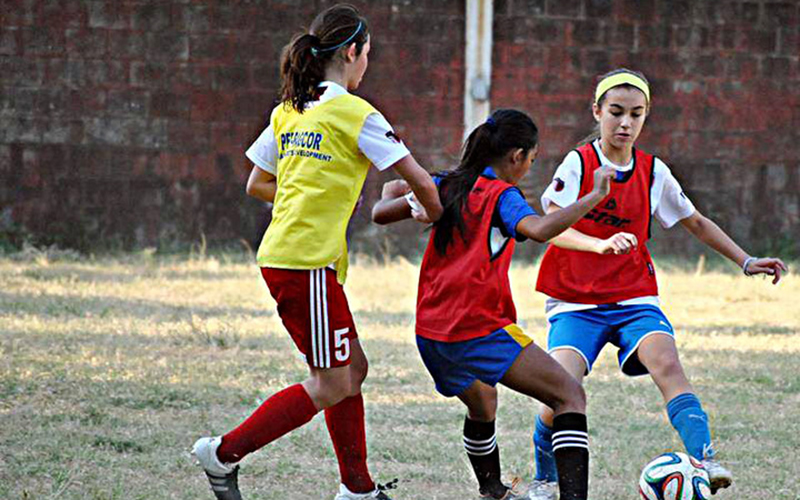
Bianca Feix fights off defenders playing soccer in Phoenix. (Photo courtesy of Teresita Feix)
PHOENIX — On a muggy night in early August 2015, Bianca Feix was trading jokes with her family around the dinner table. The hands on the clock pointed to 6 p.m. when Bianca, a 13-year-old club soccer player, was in the middle of a story when she grabbed her head.
She began feeling sharp, stabbing pains in her head. She couldn’t open her eyes because the light would make the pain even worse. Bianca brought her knees to her chest, unable to speak or interact.
She was having an intense, delayed reaction to something that had happened five hours earlier on the volleyball court, something the athlete didn’t even realize until her mother began questioning her about the pain.
“I had seen her get hit with the volleyball earlier in the day,” Teresita Feix, Bianca’s mother, said. “She had gotten hit pretty hard on a jump serve…So all of a sudden when she grabbed her head and she stopped talking and said her eye hurt and had a headache, I just had this feeling as a mom … there was a pause because we were trained as soccer parents to be aware of concussions.”
That’s what Bianca was diagnosed with hours later at the emergency room. The multisport athlete said she was surprised something so little could cause such serious effects.
“I had been hit many times before in the head in volleyball and in soccer,” Bianca said. “But it was never really anything serious so I just brushed it off and kept playing. I didn’t think that I would get a concussion from getting hit in the face with a volleyball.”
Bianca was treated by Dr. Javier Cárdenas, a neurologist at the Barrow Neurological Institute who specializes in concussion and brain injury. Cárdenas spearheaded the Barrow Brainbook, an online concussion education tool, now a standard procedure for high school athletes of the Arizona Interscholastic Association (AIA), that includes information about baseline testing of brain function.
Barrow Brainbook was launched in 2011 as a collaborative effort between the Arizona Cardinals, the AIA and the Barrow Neurological institute, Cárdenas said.
“It is required for all AIA athletes to participate in any athletic activity … they must complete the concussion education course and pass before participating,” Cárdenas said.
This program, now partnering with Arizona State University Athletics, is one of the reasons why Arizona is a leading state for concussion research, according to Cárdenas. However, the neurologist said there is still a need to reach all young Arizona athletes.
“This is not true of course for club sports, which is something that we will be working on over the next few years, as well as youth,” Cárdenas said. “The biggest gap that we see is making sure that our … grade school and junior high athletes have these issues addressed.”
While Bianca wasn’t required to complete the concussion education because her age and club affiliation did not require her to do so, she was still educated on the subject – something her mother made sure of with her daughter playing soccer.
“My mom wanted to make sure I knew what a concussion was, even before I had one,” Bianca said. “But she wanted me to make sure I didn’t get one, to know what the symptoms were.”
Bianca said while many students who suffer concussions are reluctant to tell someone, especially their parents, the necessity to give their brain time to heal should outweigh the fear of being sidelined from the sport they love. Bianca stressed the importance of athletes knowing their baseline ahead of time.
“I think you need to know what your baseline is so that if you get injured in the future, you know that you’re injured, and you can tell someone about it so that you’re not damaging your brain further,” she said.
This is what allowed Bianca Feix to step onto the soccer field on a crisp day in November, three months after her injury. Despite lingering worries, she went back into the game, fully recovered medically. But, she was still shaken mentally for several weeks until she reaccustomed herself to the contact sport.
“At first I was really, really nervous” Bianca said. “I would flinch away from the soccer ball, I wouldn’t use my head … but I realized how much I missed playing soccer so I decided I wasn’t going to be scared anymore and I was going to start playing full on.”
In April, Bianca was selected to train with the Philippines Women’s U-14 National Team.